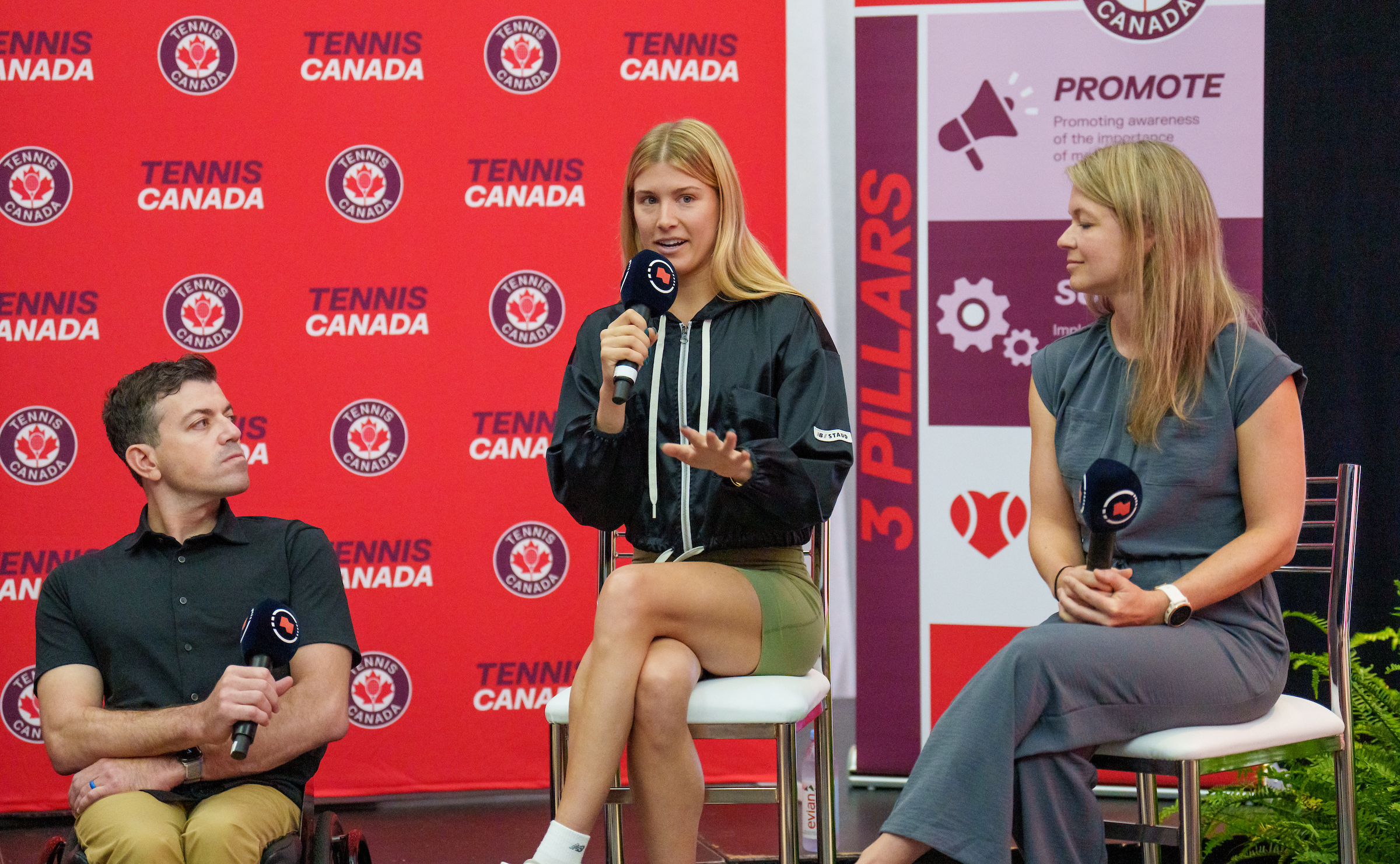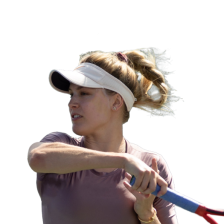On a rain-delayed first day of main-draw action at the 2024 National Bank Open presented by Rogers, Premium Series ticket holders were treated to a special panel about the importance of addressing mental health challenges in professional tennis.
Moderated by former top-ranked Canadian player and current Sportsnet commentator Sharon Fichman, the half-hour conversation included insights from four-time Grand Slam champion and former World No. 1 Naomi Osaka; 2014 Wimbledon finalist Eugenie Bouchard; Paralympic tennis player Joel Dembe; Marie-Josée Bellemare, Tennis Canada’s Director of Wellness; and Dr. Randi Jackson, one of the WTA’s mental health providers.
As one of the most popular individual sports in the world, tennis is renowned for requiring both exceptional hand-eye coordination and athleticism as well as mental acuity and toughness. But players have historically been reluctant to open up about the psychological toll of competing 11 months out of the year and travelling week-in, week-out. That culture of silence has begun to shift in the last decade, with more and more athletes across all sports speaking out about their struggles with mental health.
“When I started out on the tour when I was 19, it was a taboo subject,” Bouchard said. “You couldn't even admit you had a psychologist because there was something wrong with you. And nowadays it's like, if you don't have a psychologist, what are you doing? So just that complete shift in the narrative makes me so happy that we can just talk about this so freely.”
Read also: Putting Words and Descriptions on How We Feel
That shift has been, in part, due to athletes recognizing the value and availability of resources designed specifically to help them achieve — and maintain — peak performance. Dembe, one of Canada’s most successful wheelchair tennis players of all time, admitted that he initially didn’t think mental health was an issue that he needed to address during his playing career, in large part because so much of his life had been focused on overcoming his physical limitations.
“But the moment I started seeing a sports psychologist, I realized there's a lot I don't know. And I wish I had started speaking to a sports therapist much earlier on in my career,” he said. “I think I would've been set up much earlier for success. I would've learned to breathe a little bit more, learned to not sweat the small stuff.”
Read also: Pride and Mental Health in the Spotlight on Tuesday in Toronto
“I also was dealing with a temper,” Dembe added. “I think a lot of athletes, if you've overcome pain management, all these other things, sometimes that stuff has a way to bring itself onto the tennis court. And I think had I been able to speak openly to someone much earlier in my wheelchair tennis career, I would've been able to handle those mental health issues much earlier.”

Osaka, who famously took time away from the sport to deal with her own mental health challenges and later became an outspoken advocate on the subject, stressed that everyone deals with these issues differently. For her part, she said she loves to meditate and listen to rain water, but she is always finding new ways to unwind.
Read also: Recognizing the Signs of Stress and Anxiety
When asked by Fichman about what she does to cope with those mental challenges, Osaka said, “Just thinking about the word ‘cope’ makes me feel like I don't always have difficult times. But I guess when I do, I think it's important to find what fits for you.”
Osaka said she personally loves “having a family atmosphere” around her, particularly when she’s practicing and competing. “People always say that [as tennis players] you're playing by yourself, you're singular, you're not in a team. But for me, I find that to not be true because I travel with my team around me everywhere,” she said. “It’s great because we travel together, we get to know each other, we have fun together. And I think for me, I love having people with a joyful atmosphere around. So I would say they play a really big part [in maintaining my mental health].”
Read also: Top Stars Shift Focus from Olympics to Toronto
Across the sport, Tennis Canada has led the charge to address the concerns about the unseen part of the sport through the Mental Timeout Initiative supported by Beneva. The response from athletes, parents, coaches and Tennis Canada staff “has been very positive so far,” Bellemare said, but “we know that our mental health strategy is not a quick fix. We know it’s a long journey.”
Players this week at the National Bank Open have access to a bunch of resources, including a wellness passport with all the resources that they can access at the stadium and a dedicated relaxation zone where only players can have access to different sensory experiences in a pod. Fans can also sign the positive court pledge and write a Positivity Postcard to their favorite players, who will be hand-delivered the messages throughout the week.
The WTA has long been invested in maintaining the well-being of its athletes, with Jackson joking that the association tries to take care of them “from their toes all the way up to their head.” The traveling staff now includes five mental health care providers, who are present at all tournaments from the WTA 250-level and up (including at this year’s Olympics) and have just begun to make their presence known at the smaller WTA 125 level as well, Jackson revealed.
Read also: WTA Stars Match Up Well Against PWHL in Annual Ball Hockey Game
At the end of the day, the tour is looking to increase access to mental health resources — while taking into account cultural and linguistic differences — and find proactive and preventative ways to prevent issues.
“We are positioned usually near where they receive their physical therapy and rehab, so they know exactly where to find us,” Jackson said of the tour’s close “integration” strategy between performance and mental health. “Our services are free to the athletes. Access is really important in mental health care. They can use our telehealth services as well, so if they meet one of us at a tournament on site, we provide that continuity of care. Wherever they are in the world, they can access our services.”

But for all the problems they may face off the court, players are aware that they are in a particularly privileged position to be able to seek support — and to have a platform to encourage others to do the same.
“I also agree that in the moment we feel so much pressure and I feel it's so physically hard on the practice court and so much pressure on the match court. But then now I look back [on my career] and I'm like, ‘Those were the best times of our lives,’” Bouchard said. “And I know I enjoyed it and I don't have regrets about that, but if there was a way to even savor it even more, I wish I could somehow do that, because it's such a unique experience that we have. … I'm so beyond grateful, more than anything, because it's just such a unique life that I've been lucky to live.”
The WTA's best return to Toronto this summer for the National Bank Open August 4 to 12, 2024 at Sobeys Stadium. 2024 Tickets are on sale. Get your tickets today!
Feature Photo: Tyler Anderson












